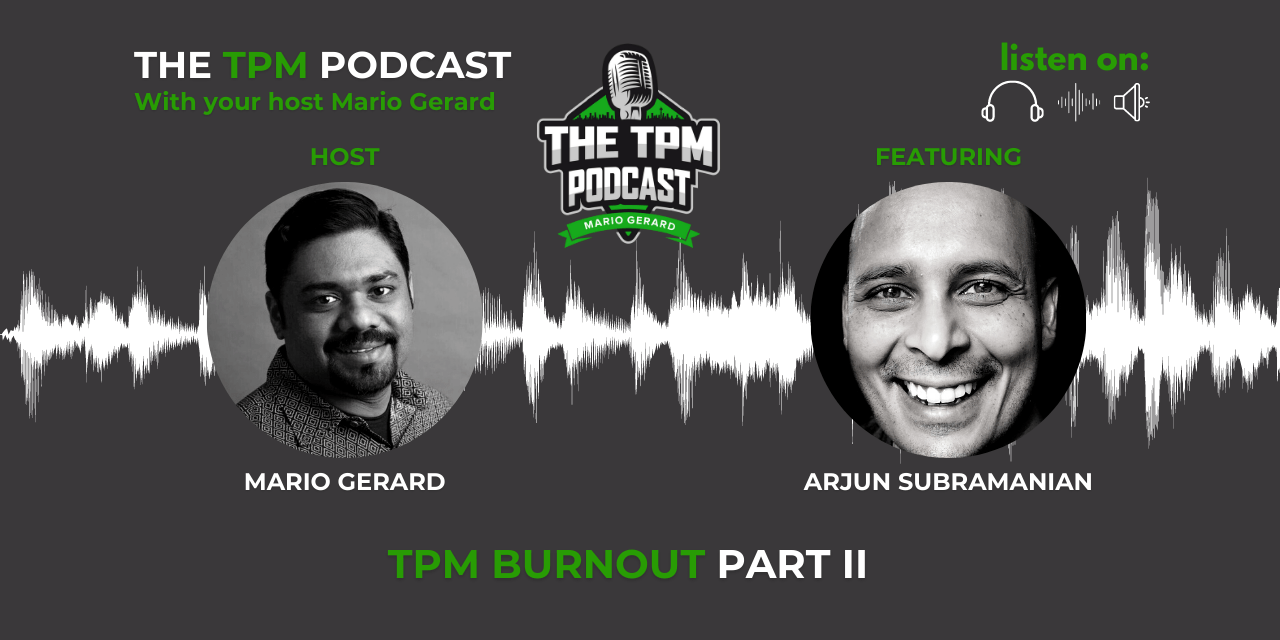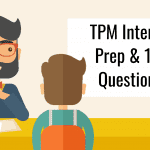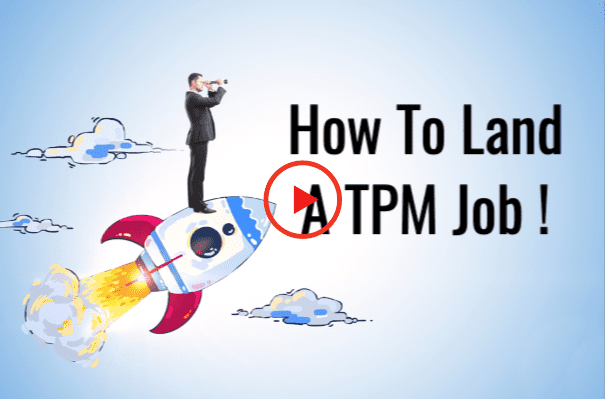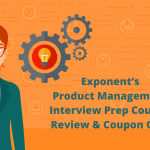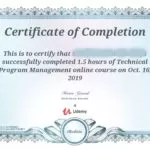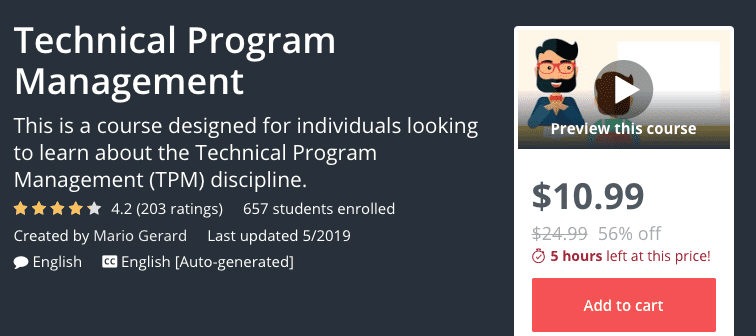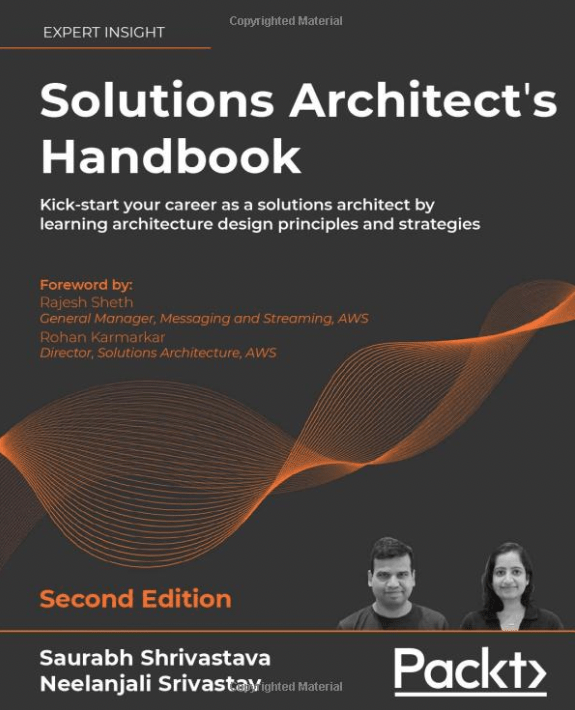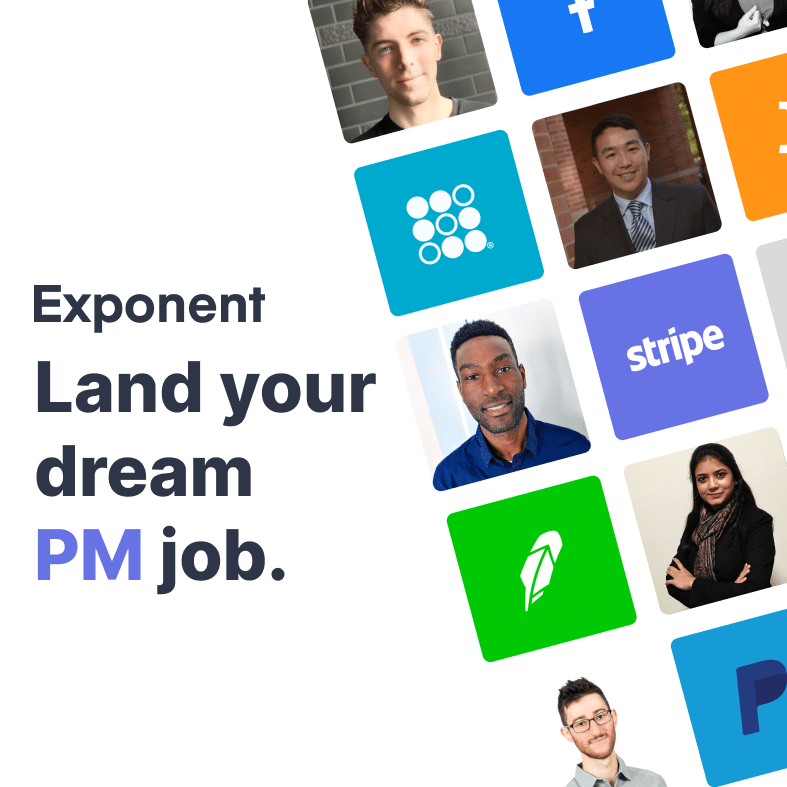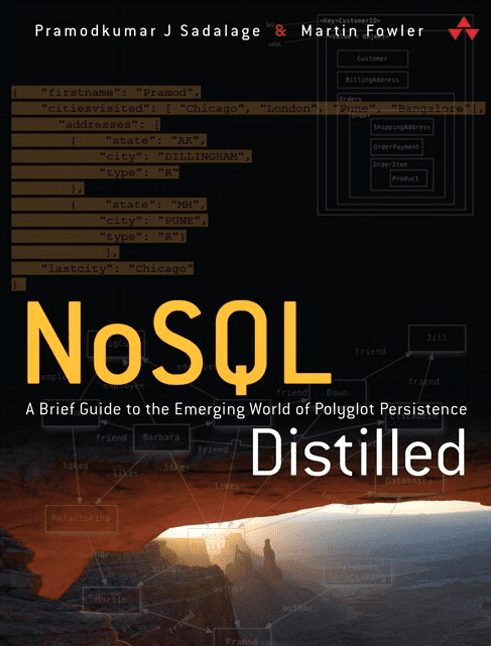Last updated on August 19th, 2022 at 01:04 am
Podcast: Play in new window | Download | Embed
Hello, and welcome to the TPM podcast with your host Mario Gerard. This is part two of the second episode on burnout with Arjun Subramaniam. I hope you caught the first one. If you haven’t definitely listen to that first before you listen to this. It’s going to be super interesting. As we continue to discuss how burnout affects all of us.
Episode I – Part I (TPM Fundamentals)
Episode I – Part II (TPM Fundamentals Continued)
Episode II – Part I (Burnout)
How to combat burnout
Mario Gerard: how do you combat burnout? You feel that you are in the burnout phase. Maybe if you are, what are the things that you tell people to go and try to do.
Arjun Subramaniam: So I’ll share a little bit about my own life at the base of all these core Technical Program Managers’ skills that we talk about, like in Latin podcast and this one, I think there’s some skills here too. I think that there’s a kind of a set of fairly textbook advice Someone will give you and they’re all good advice. You should just do them. Okay. Eat right. Don’t drink too much exercise. Learn to get some rest. Don’t use electronics too late at night.
This is all really good advice. You should just do that. Like no beef with any of it, you should just do it. And all of them will reduce the likelihood that you will burn out. I think that for a lot of people, this advice can never actually come true in their life because there’s something else, there is something else got to deal with. Right.
It’s a lot like if someone just came and told you and you are an alcoholic or whatever, it’s like, well, that’s easy. Just stop drinking alcohol. And you’re like, well, clearly I’m not able to do that. And so I think the conceptual frameworks of some of the stuff is helpful only to the extent that you’re able to execute on it. And most people who are already at that stage, they don’t need to be told [01:42 inaudible] framework. They can just be like, oh yeah, I get it. I’m going to go do those things.
So if you’re not one of those people, what should you do? Right. And I think this is where it gets really interesting. You got to figure out what’s bothering you. What’s a miss in your life. And no one can answer that except for you. You got to figure out what your story is and just own it.
And you got to figure out why you’re feeling the way you are. You basically have to claim authorship of your story. Whatever that story is, you got to just claim authorship of it. In order to do that, It’s a sizable investment of time and energy, and you’ve got to have a willingness to go and do that. Yeah. So that can be at a place where the conceptual frameworks of wellbeing can actually work in your favor.
And that stuff is really hard. There are two things that really helped me. And one of them was cognitive behavioral therapy. I was in behavioral therapy for about seven years and it made me a better person, a better professional. It helped me understand my own story. I grew up in a very difficult family. It helped me understand some of the causes of my stress and understand how much of it was still things that I had to work through. That was very helpful.
And I highly recommend it for anyone that wants to understand themselves better. I can tell you that it dramatically improved my ability to function as a person. And that showed up at work a hundred percent, a hundred percent.
Mario Gerard: It shows up in your entire wellbeing.
Arjun Subramaniam: It shows up in my entire life.
Mario Gerard: And wellbeing. Right. Gender wellbeing, which translates to facets of your life. Could be personal, Work. Everything changes.
Arjun Subramaniam: My relationships were better. Everything in my life got better, but I will say it was a sizeable investment of time and of time and energy. It was like, you know, three times a week for seven years. So it was a long time. The reason why I had earlier alluded to the importance of having a diverse source of information, I think a lot of what it takes to live a good life has actually been discovered, rediscovered, written, and rewritten for thousands of years.
Okay. People, you are not the first person to wake up in the morning and go what’s wrong in my life. There’s nothing new in that question. And I assure you, there is a body of work from people that have lived lives remarkable lives and have tried to answer that question and come up with a model for how to live a good life.
There were really two very impactful things. One was Victor Frankl’s work, you know, man search for meaning. And then all of the writings of [04:18 inaudible] philosophers, very, very influential in helping me just be a better person. And I try to practice them every day. And there’s a lot of just deep rooted wisdom in how to handle adversity, how to be tenacious and gritty, how to carry yourself in a world that’s complicated and can have lots of roots surprises for you.
You control some things, but you don’t control a lot of things. And how to handle that. And I’m not saying this has to be the path for everybody. But I think that a lot of times the wellbeing recommendations tend to come in the flavors of eat Right, Exercise, eat right. But I think that I wish more people would ask everyone to dig a little deeper.
Because I think what really ills people is an internally consistent, authentic view that feels like really authentic of what wellbeing is like, what is a life well lived.
Mario Gerard: And you have to define that first.
Arjun Subramaniam: You have to do that yourself. You have to do that yourself. And if you do that and you live it, then wellbeing is an output. It comes from that wellspring of deep rooted kind of wisdom.
Mario Gerard: Which you have found yourself, which is very specific to you as well.
Arjun Subramaniam: It is very specific to you and it is not about others. Like there’s nothing about this that has anything to do with anyone else except me. It’s my story. It’s my choices. I’m in control and whatever choices, outcomes, all of that belong to me. And it’s not for everybody, but all I’m saying is that maybe the decision to go down that road can be helpful to others.
Helping yourself and your colleagues
Mario Gerard: That makes perfect sense. Probably the next question we have is how would you help yourself and your colleagues, if you kind of identify that somebody else is having a tough time, what would you do to help them out?
Arjun Subramaniam: I wish if one thing people would know about me to help them. I think a lot of people just want to know that people care about them. Humans are deeply primed for social contact. And a sense of tribe and unity.
Mario Gerard: And I think with not having that in the physical world, it’s becoming harder, but you need to spend that time with your colleagues, encourage them, be empathetic to them, appreciate them. And you know?
Arjun Subramaniam: Yeah. And it’s interesting. I don’t think no one can control what other people do. This is not, it’s just not how the world works. Right. It’s not how humans work, but if you are kind to others, you have a better shot at a positive influence than if you are not. It really just comes down to that.
Mario Gerard: But don’t do it for X or Y reason do it. It has to come from the heart.
Arjun Subramaniam: Yeah. It has to come. It’s real. It’s totally real. It’s like a lot of times these words, like, you know, if you’re kind to someone, it can be conflated with like being inauthentic or being a people pleaser or someone like that. Like being kind to someone is also being candid with someone not disrespectful, but being candid. It takes courage to be candid with someone and being kind to someone just means that you’re coming at this from a good place.
Mario Gerard: That you are there with that person, you will step in if needed. You’ll help them if needed. You’ll give guidance, your unfiltered feedback, all those things, all those things.
Arjun Subramaniam: All those things. And sometimes everybody’s got to own their own lives and sometimes it works, but I can tell you, I Don’t know of a single person who truly experienced kindness. No matter what the outcome was. Right. Who truly experienced just the relational quality of kindness and said, man, I wish that that hadn’t happened.
What could leaders do?
Mario Gerard: No, absolutely. It’s an intrinsic quality that we all look forward to receiving. I think those are very interesting points as leaders. What could leaders do for their employees in general, but also in the context of burnout and in the context of setting people getting burnt out, like what could leaders do?
Arjun Subramaniam: Oh man, this one is such a good question. There’s a set of answers to this question. And I think that after the pandemic, I think a bunch of the stuff just to get thrown out, I do, I do. And I think there’s a lot of stuff that the pandemic I think is exposing. And I don’t mean as leaders as in like the software company CEOs or whatever.
Mario Gerard: Every manager, every person.
Arjun Subramaniam: Yeah. Every person. And also just look at like institutional leaders, right. People that run on like big organizations or whatever. I think the pandemic has created an Emperor has no clothes moment for a lot of institutions and a lot of leaders that is obvious to everybody except them. All right.
And when normal people look around, right. They’re like, you know, we’ve got essential workers that turns out once they’re not essential anymore, we don’t really take care of them. We’ve just got a hyper financialized, hyper mechanized, hyper GDP-oriented economy.
Mario Gerard: The capitalist after all.
Arjun Subramaniam: Capitalism is amazing. I just want to, I just want to go on the record and say, capitalism is amazing. Okay. I am a huge beneficiary of capitalism. Someone like me could not exist just like you, you know, like I’m an immigrant born in India and I live an amazing life.
Mario Gerard: And we couldn’t do it without capitalism.
Arjun Subramaniam: Yeah. Capitalism is amazing, but it’s not about capitalism. There’s nothing about the capitalist system that says that we shouldn’t value things more than GDP. Yeah. Okay. There’s bugs in the system. Like there’s negative externalities. Right. Any, any economist will tell you that there are pricing errors that happen all the time in capitalism.
And I think to some extent, many of the institutions like the workplaces and the research issues or whatever, right. Like all of them, they’ve all kind of been built with some of those metrics in mind. And there’s a lot of lip service before the pandemic about health and wellbeing and of the workforce and all of that.
And I think there was good intentions. Okay. But they were all kind of a second order effect. Yeah. Of growth and all that stuff. Of the economic outputs. There’s nothing wrong. And in fact, we have to have a vibrant growing economy For people to feel good.
There’s no way you’re going to take 7 billion people and bring wellbeing to them without like a growing economy. But I think the shift that needs to happen is we’ve got to find a way to prioritize the impact on workforces under massively stressful events that has to factor into the equation.
Cause what’s happening is because it’s a negative externality. It’s a little bit like sewage in the lake. There’s no cost to it. So if you think about all of the impact that falls on employees, their families, their extended families, there’s a social lake. That’s been absorbing like a shock absorber. It absorbs the impact, But there’s no pricing of it.
So what happens is you get a lot of people that really dissatisfied and sad. And it also means that like you create corporations and you create like jobs to your point that have no meaning. Yeah. Like you’re just like some kind of bean counter or like moving on spreadsheets around, by the way, things to be grateful for a lot of [11:31 inaudible] don’t have this kind of job.
But there’s a lot of the economy that does. And so what happens is you have a, of people, even the ones that have jobs and they have this stuff, right. They’re under a lot of stress. And for all the reasons we’re talking about, you know, like the lack of meaning, the lack of connection, lack of engagement, all that stuff, it shows up, right. It shows up in the way they are, the people they are and that kind of thing.
So your question was, well, what could leaders be doing different? I think we got acknowledged that this is a real negative externality because right now, like even after the pandemic, right. If you looked at all of the, how many CEOs said, we need to go back to work. Without fully acknowledging we’re not even past this thing yet.
Nobody knows how this is going to turn out. The vast majority of the world is in vaccinated and there’s all of these consequences to the world’s workforces. And that consequence is not some second order effect to your quarterly numbers. It’s just not right.
It’s got to be a first order bit. That’s an Amazon expression. Right. It’s a first order bit. It’s just not incidental. We’ve got to literally say like, look, the whole world is going through like a collective trauma with COVID and it’s not right to just brush it aside, brush it aside. There’s definitely sewage being flown into the lake here. And at some point the carrying capacity of the lake finished.
And so we got to acknowledge that and we got to go. Now the thing is, there’s a lot of good people that are trying to do. And it’s always a balancing act, but like, I definitely think there’s a lot more around acknowledging the elevation of this Into a first order bit that needs to happen.
Where you look at the workplace and the workforce and you think about, well, what is the set of businesses that can be built where meaning is at the center, right. Where the jobs are actually like a creative to that person’s wellbeing.
Mario Gerard: You need to put in a lot of thought to do that. And you have to like consider it to be a real first start bit and think about it that otherwise you’re just going to add, you’re going to make some small changes. Don’t really make that impact.
Arjun Subramaniam: No, that’s exactly right. That’s exactly right. Like I think what has happened with the pandemic. Before the bias was always to its incremental change. Like little bits like here and there. And I think what the pandemic, what has happened is a lot of these institutions they’re in this mode where they can’t quite go with incremental changes anymore.
They’ve got to start flipping.
Mario Gerard: Something dramatic, something drastic, something meaningful.
Arjun Subramaniam: And I think it’s happening. I actually think some of the tech companies actually leading the way here. Right? Like, so if you look at the number of companies that said we’re going remote. Which is going to lean into this new world. And now there are jobs you cannot remote. So just be upfront about that. But I think that I’m more alluding to the mental model. I’m saying that like the principle is not to resist the change. But lean into it.
Mario Gerard: Yeah. I think there’s another tech company, a very large tech company in Seattle, also who’s doing like three months mental leave if you want. So you have to have those kind of options for your employees so that they can take the time off. They need to take the time off. Because unless that’s an open item that they can use, it’s, it’s kind of hard to go about doing right.
Basically you needed to really have a lot of empathy. And I think another thing which I was thinking was you shouldn’t make everything a priority and push everything, Like make your teams run twice as hard Maybe. You got to give people some downtime and have them relax a little bit, maybe even.
Arjun Subramaniam: Well, yeah. And I think that gets to the first order bit versus this incidental thing that we talked about before is that, a lot of times that’s exactly what’s happening is that the prime directive is whatever that goal they’re trying to hit is. And then like the rest of cooperation, all that stuff is like all below the line.
Now again, you know, I think I don’t want to speak in generalities. There’s a lot of companies doing this. Right. But we’re trying to answer the question, what could leaders do? And I think you don’t have to go very far to find people that work that just don’t have the privileges that like someone who works at a Google or a Facebook does. And that’s the important thing.
Mario Gerard: So I think I have had couple of other points if you are at a leader level, right. You could definitely do some things where you’re setting aside time for team events. You could have things, small things that make a difference, like no meeting Fridays help build a sense of comradery within your teams, improve direct communication with your directs and with your teams.
Have periodic check-ins with your team and those kind of things. I think all those things kind of you got to build a strategy around it. Even if you’re not like an Uber leader. If you have a couple of teams, if you have 50 people, 20 people, whatever it is. I think you need to come up with a strategy of how you are kind of training your leaders, who in your organization to identify burnout, identify, navigate mental health problems that your employees might be facing.
But at the same time, like comp with the strategy, which you and your team can have use.
Arjun Subramaniam: Yeah. No. And I think those are super important on a more, you know, manager by manager, like, you know, tactical basis. That’s like block and tackle. You got to do that.
Mario Gerard: You can’t like put it aside and say, oh, I’m not going to do that. I think it’s becoming a core part of every manager’s job to have a very good strategy around this and to actively be thinking of how they’re going to boost team morale, how they’re going to build team spirit, because you’re not in, at work anymore. I think when you’re at work physically, I think things used to naturally happen.
Like people used to meet talk together for lunch. And that used to like, just happen. The chemistry was just right. The people would all coming together, but I think in today’s world where everything’s distributed and everybody’s working from home, I think you’ve got to spend more time to figure out how you’re going to do that for your team and how you’re going to enable your team to do that.
Arjun Subramaniam: That’s absolutely right. Like all of the rituals just got taken away. Because of the pandemic. So a lot of the connective tissues gone. And I think this thing I noticed with younger, you know, there’s now been an entire, I think like two cohorts of fresh undergraduates who joined the workforce in COVID.
And I now have had some time to observe the impact is so different for them than it is for someone even like a few years, more senior to them Or someone like me, who’s more been in the workforce for a while. And I think it’s very, it’s very disruptive to that entry level person. They don’t have any of the habits of working. They don’t any of the preexisting handshakes and the kind of learned little things that you pick up along the way of how to like connect with someone.
And someone middle of their career. I think going to handle this a lot better than someone who’s brand new to their career and that isolation and not finding the ability to connect with other people, company and learn that stuff’s going to hurt. Now with that said, I think there’s a flip to this, which is, it’s also encouraging, I think a lot of people to find creative ways to work, creative ways to think and build relationships.
And I think there’s an entire world of opportunity in learning to build relationships in a professional setting in a structured way. Where you’re disciplined about it instead of just like bumping into someone. Which has some value, like, you know, the serendipitous thing. Yeah. But I will say that like, if you want to build deep, meaningful professional relationships, you have to have trust.
And in a professional setting, trust is built by saying what you will do and doing it. That’s the first component of trust and two, understanding where that other person’s coming from, like understanding their world of view. If you do those two things, you will build trust.
That is not a happy hour. That is not water cooler. That is not you shooting this at the pool table with someone that is how you build trust that lasts like that deep trust. And it will carry you through jobs. Those relationships and it will take you very far. And I think if I had known that, or if I had had a pandemic in your early twenties, it’s an opportunity for you to learn that real fast and really, really just kind of hone that skill. So a lot more of your relationships are out of that deep, deep trust.
Concluding remarks
Mario Gerard: Yeah. Most of the things which we wanted to cover, I think we covered most of those things. And I think we got a lot of good content. Any last words?
Arjun Subramaniam: Yeah. I think there are certain things that will pay you back no matter how much time passes certain skills. And I think that you can’t go wrong practicing some of this stuff.
And the things that we talked about in the last two podcasts, learning to think from first principles in a structured way, active listening, being able to build trust, being kind, taking care of yourself and not letting burnout hit you, knowing your own story, owning it, and understanding your own internally calibrated that shows you where to go.
Building your own tribe. That’s not just colleagues, but like a tribe of people that care about you. That cause your values, this stuff. There’s a lot of things in the world that’ll change. We might have like flying cars, colonized Mars, but I’m absolutely certain about these things. They won’t change.
Mario Gerard: And the qualities and skills that last for many lifetimes, right? It’s not just this job or it’s not just this profession. It’s whatever you do tomorrow. Even if you completely switch careers and become something totally different, they’re still going to come and be very handy.
Arjun Subramaniam: They are life skills. And they apply outside of your job. So it’s like, I’m almost like it’s like a no-brainer. Like why wouldn’t you do these things? You’ll be a better person. You’ll be a better spouse. A better father, better mother. Just do them.
Mario Gerard: So nice of you to join us Arjun. And this is a fantastic, fantastic conversation. Thank you so much for sharing your thoughts with the, our listeners and for everybody who’s listening, do stay tune for many more podcasts coming your way. Thank you so much Arjun. See you then Bye. Bye.
Arjun Subramaniam: Thanks Mario.
I really hope that gave you some new information that you didn’t know and you could put that information to real use. This is definitely outside of the TPM podcast, which I normally so. But Arjun and I, when we went, we really felt that somebody needs to talk about this. And since both of us had a little bit of experience on burnout, we said, okay, let’s do an episode for all our friends.
So I hope you enjoyed that. And I hope you got some good takeaways. If you’d liked it definitely like, and share it with your friends and also leave a review on Google play or podcast app. Thank you so much my friends. Bye, bye.

